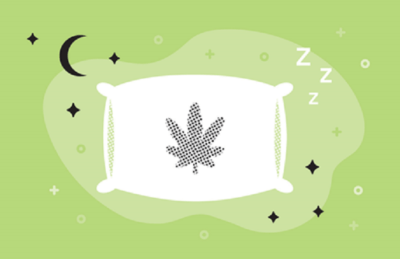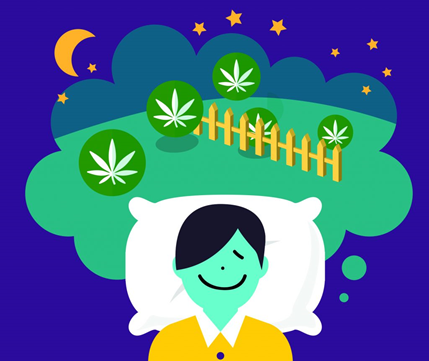Does CBD Help With Sleep ?
One of the number one things that people ask me when they find out that I own a CBD business, practically on a daily basis is, “Can CBD help with sleep?”. In short, “probably”, but there is a minor caveat to that. First though, let me explain a little bit about the cannabinoid system and why it’s important to the answer of that question. We are all created with multiple systems that work together in harmony to allow us to eat, sleep, breathe, and pursue happiness. Most of you have heard about our cardiovascular system, our respiratory system, and even nervous system, but many have NOT heard about our Endocannabinoid system. WHAT?! Our bodies have a system made to specifically receive and utilize cannabinoids?! YUP! We are actually built to receive CBD (short for cannabinol)!!!!
Sooo what does the endocannabinoid system do? It’s important to realize, that as far as bodily systems go, the Endocannabinoid System or ECS for short, is still fairly new in its discovery since researchers just identified it in the early 1990’s. It’s also important to recognize that our ECS is always active, regardless of whether we are consuming cannabis or not. Turns out, the ECS is actually pretty handy! We know that it plays a role in maintaining homeostasis in a number of areas such as sleep, mood, appetite, memory, and even reproduction/fertility. Our endocannabinoid system has two main types of receptors, CB1 and CB2. Endocannabinoids can bind to both of those types of receptors. Guess what else can bind to both of those receptors? THC! Our body already makes its own cannabinoids, but when our bodies are out of whack, cannabinoid production may suffer and this is when we start to see changes in sleep, mood, etc. Some researchers even suggest that endocannabinoid deficiencies could lead to migraines, fibromyalgia, and even irritable bowel syndrome! I think it’s pretty safe to say that there is definitely a place in our medicine cabinet for cannabis products, depending on what state you live in, that may be high THC products, or it may be low THC products, like CBD, but either way, most people can benefit from CBD.
Here is that caveat though…..apparently there IS a small percentage of the population, roughly 20%, that do not respond to CBD. So while the possibility exists that you will not respond favorably to CBD, there are many other reasons why CBD might not be working for you (see blog titled “Why Doesn’t This Shit Work?”). The good news is, in the several years that we have been in business….we’ve only had ONE person try to return their products for that reason! That means that most of you reading this will NOT have a problem with CBD working for you and a good night’s sleep may be just around the bend.

As I mentioned earlier, our endocannabinoid system helps regulate processes that are involved in sleep, which means that inadequate levels of cannabinoids in our system would have the potential to mess with our sleep cycles. Introducing cannabinoids into our system via THC products may not only help you fall asleep, but stay asleep longer. There are so many things that can cause us to have difficulty falling asleep, but some of the more common issues would be pain and anxiety. Cannabis, in the right dosage, can tackle both of these issues. A 2019 research study involving 72 subjects found that 25mg of CBD taken in capsule form for one month resulted in lower anxiety levels in 79.2 percent of the subjects, while 66.7 percent reported better sleep. This shows us that reducing anxiety can dramatically increase our chances of better sleep. As for pain reduction, there are a variety of products that do just that. Delta 8 gummies in either 50mg or 100mg dosages are very powerful pain relievers since THC blocks pain receptors and also reduces stress and anxiety so you can fall asleep as you feel the pain ease from your body. Sadly, so many people live their lives in a heightened sense of pain and/or anxiety that they don’t even realize how bad they feel, until they don’t feel bad anymore! Fortunately, Cannabis products can offer aid in these situations, since it is thought that cannabis products may have relaxing effects on the nervous system as well as altering serotonin levels as it may effect the serotonin system. Altering serotonin levels can effect our moods for the better, although this result will vary wildly from one person to the next. It is for this reason, however, that some people may find moderate relief from mood disorders with the addition of CBD to their daily health regime. Aside from addressing pain and anxiety, there are a few other common sleep issues that cannabis can aid such as:
Insomia
Insomnia is often used incorrectly to mean someone who simply cannot sleep, but insomnia is actually more common because it also encompasses those who have difficulty falling asleep and/or staying asleep. It’s actually a pretty broad catchall term for people who have trouble sleeping and is thought to be experienced by roughly 30% of the population at any one given time, according to the American Sleep Association. If you’ve ever experienced insomnia for yourself, you realize that half the battle is falling and staying asleep, but the other half is the anxiety surrounding falling asleep. You begin to dread climbing into bed at night because each night brings with it the uncertainty of how long you will lie awake, or if you will even get an hour of shut-eye. CBD has great potential in reducing the anxiety surrounding insomnia, which can provide a great amount of relief in itself.
REM Sleep Disorder
REM, which stands for Rapid Eye Movement, is an incredibly important part of sleep, as this is the time when we are in our deepest, most restorative sleep. Under normal circumstances, mechanisms in our brain “paralyze” us for our safety, to keep us from trying to “live out our dreams” LITERALLY. With REM sleep disorder, a person may act out their, oftentimes unpleasant dreams through movements and or vocalizations. Exactly as it sounds, this can be dangerous to both the person and any other people they share sleep space with. While studies are still very limited, a small study showed that before taking CBD, the participants experience symptoms of the REM disorder 2-7 times per week, but AFTER taking CBD, their symptoms occurred 0-1 times a week! This could mean great, CBD help with sleep sleep for REM sleep disorder sufferers!
Excessive Daytime Sleepiness Disorder
Excessive Daytime Sleepiness (or Hypersomnia) is characterized by excessive daytime sleepiness or excessive amounts of time spent sleeping. A person with Hypersomnia may fall asleep at anytime, even while driving. A person who suffers from EDSD can be a danger to themselves and others, but just like practically a million other things, Cannabidiol may have a fix for that too. Preliminary studies conducted by Eric Murillo-Rodriguez et al. have found that, in rats, injections of 5mg/kg of CBD helped block sleepiness in those who were injected. Furthermore, there is some research that specific types of CBD may promote wakefulness in those with/without hypersomnia.
So yes, if taken right, it is likely that CBD help with sleep and makes you sleep like a baby.

Sources:
https://www.healthline.com/health/endocannabinoid-system#deficiency
https://www.healthline.com/health/cbd-for-insomnia#research
https://www.sleepfoundation.org/how-sleep-works/cbd-and-sleep
Murillo-Rodríguez E, Millán-Aldaco D, Palomero-Rivero M, Morales-Lara D, Mechoulam R, Drucker-Colín R. Cannabidiol Partially Blocks the Excessive Sleepiness in Hypocretindeficient Rats: Preliminary Data. CNS Neurol Disord Drug Targets. 2019;18(9):705-712. doi: 10.2174/1871527318666191021143300. PMID: 31642794.



Wife has neuropathy in her foot and she has had a hard time getting to sleep because of the pain. What would you suggest for her? She is not a user but I’ve been one for 50 years.
We would go with the Delta 8 50 mg per gummy gummies, Cut in half to start and see how that works for sleep (Dial In the dosing from there). Then I would have her take 2 times a day a 2000 mg or 3000 mg Broad Spectrum Tincture and that will help out her neuropathy.
What is Broad Spectrum Tincture? She tried gummies and didn’t have much luck
It is a CBD oil with all the cannabinoids from the hemp plant, broad spectrum how ever is not meant for sleep , thats more geared for anxiety and inflammation reduction. You would need Full Spectrum or THC for sleep.